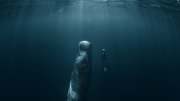The July-August cover story about efforts to decode the click communication of sperm whales prompted numerous letters, including one that detailed the involvement of a talented undergraduate, Peter Bermant ’19, in the project’s origins. He ultimately co-authored a key paper on the bioacoustics of sperm whale vocalizations that was published in Scientific Reports in 2019.
Bermant was concentrating in physics during the 2017-2018 academic year, when marine biologist David Gruber was a fellow at the Radcliffe Institute for Advanced Study. Initially drawn by Gruber’s designation as a National Geographic Society Emerging Explorer, Bermant ultimately began working with him as part of the Radcliffe Research Partnership program, which pairs undergraduates with Radcliffe Fellows. Bermant was co-advised by Gruber and computer scientist Michael Bronstein, another Fellow who is now DeepMind professor of artificial intelligence at Oxford University. Together with them and biologist Shane Gero and Robert Wood, the Harry Lewis and Marlyn McGrath professor of engineering and applied sciences, Bermant participated in the published research.
Bronstein guided Bermant in choosing the machine learning techniques and approaches that should be applied to the sperm whale bioacoustics data, recalls Gruber (see “Decoding the Deep,” July-August 2024, p. 26). Bermant, who was completing both undergraduate and master’s degrees in physics, Gruber continues, “taught himself Python, a programming language, so he could carry out the project.” He noted:
Peter is incredibly detail oriented and diligently followed through with the research, even after the Radcliffe Research Partnership concluded. He is first author on the publication “Deep Machine Learning Techniques for the Detection and Classification of Sperm Whale Bioacoustics” which has now been cited 139 times since 2019. Peter's efforts were instrumental in providing proof-of-concept that advanced machine learning could be useful when applied to sperm whale bioacoustics. This study played a key role in the formation of the non-profit organization Project CETI—founded in 2020.
Project CETI (the Cetacean Translation Initiative) aims to decipher sperm whale vocalizations. Headquartered in New York, the nonprofit conducts field research in Dominica. Bermant, who is also a talented ultra runner, currently works as a senior machine learning engineer at Conservation X Labs, an organization that is employing technology and interdisciplinary collaborations to prevent human-induced mass extinction. Previously, he worked at the Earth Species Project, (a nonprofit using AI to decode non-human communication), and at the Colossal lab run by Winthrop professor of genetics George Church, which is applying genetic approaches to elephant conservation and wooly mammoth de-extinction efforts.









